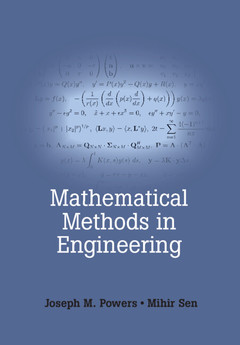Description
Mathematical Methods in Engineering
Authors: Powers Joseph M., Sen Mihir
Designed for engineering graduate students, this book connects basic mathematics to a variety of methods used in engineering problems.
Language: English
Approximative price 77.28 €
In Print (Delivery period: 14 days).
Add to cart
Publication date: 01-2015
633 p. · 18.2x26.1 cm · Hardback
633 p. · 18.2x26.1 cm · Hardback
Description
/li>Contents
/li>Biography
/li>
This text focuses on a variety of topics in mathematics in common usage in graduate engineering programs including vector calculus, linear and nonlinear ordinary differential equations, approximation methods, vector spaces, linear algebra, integral equations and dynamical systems. The book is designed for engineering graduate students who wonder how much of their basic mathematics will be of use in practice. Following development of the underlying analysis, the book takes students through a large number of examples that have been worked in detail. Students can choose to go through each step or to skip ahead if they so desire. After seeing all the intermediate steps, they will be in a better position to know what is expected of them when solving assignments, examination problems, and when on the job. Chapters conclude with exercises for the student that reinforce the chapter content and help connect the subject matter to a variety of engineering problems. Students have grown up with computer-based tools including numerical calculations and computer graphics; the worked-out examples as well as the end-of-chapter exercises often use computers for numerical and symbolic computations and for graphical display of the results.
1. Multivariable calculus; 2. Vectors and tensors in Cartesian coordinates; 3. First-order ordinary differential equations; 4. Linear ordinary differential equations; 5. Approximation methods; 6. Linear analysis; 7. Linear algebra; 8. Linear integral equations; 9. Dynamical systems.
Joseph Powers joined the University of Notre Dame in 1989. His research has focused on the dynamics of high-speed reactive fluids and on computational science, especially as it applies to verification and validation of complex multi-scale systems. He has held positions at the NASA Lewis Research Center, the Los Alamos National Laboratory, the Air Force Research Laboratory, the Argonne National Laboratory, and the Chinese Academy of Sciences. He is a member of AIAA, APS, ASME, the Combustion Institute, and SIAM. He is the recipient of numerous teaching awards.
Mihir Sen has been active in teaching and in research in thermal-fluids engineering – especially in regard to problems relating to modeling, dynamics, and stability – since obtaining his PhD from Massachusetts Institute of Technology. He has worked on reacting flows, natural and forced convection, flow in porous media, falling films, boiling, MEMS, heat exchangers, thermal control, and intelligent systems. He joined the University of Notre Dame in 1986 and received the Kaneb Teaching Award from the College of Engineering in 2001 and the Rev. Joyce University Award for Excellence in Undergraduate Teaching in 2009. He is a Fellow of ASME.
Mihir Sen has been active in teaching and in research in thermal-fluids engineering – especially in regard to problems relating to modeling, dynamics, and stability – since obtaining his PhD from Massachusetts Institute of Technology. He has worked on reacting flows, natural and forced convection, flow in porous media, falling films, boiling, MEMS, heat exchangers, thermal control, and intelligent systems. He joined the University of Notre Dame in 1986 and received the Kaneb Teaching Award from the College of Engineering in 2001 and the Rev. Joyce University Award for Excellence in Undergraduate Teaching in 2009. He is a Fellow of ASME.
© 2024 LAVOISIER S.A.S.
These books may interest you

Advanced Linear Algebra 129.87 €



